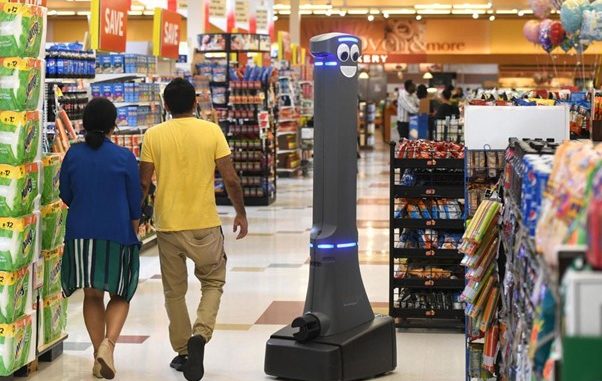
The grocery industry – supermarkets, convenience chains and wholesalers, and also the brands that sell into them – have always been laggards when it comes to adopting new technology. However, they have been leaders in adopting computer vision (a discipline within AI) since stock on shelf is key for great retail execution.
Most leading supermarkets and leading fast moving consumer goods (FMCG) companies use computer vision technology in their planogram compliance and merchandising software, That is, using image recognition software to monitor shelf stocks and layout. Some innovative retailers have even deployed robot-like devices to monitor out of stocks, planogram compliance issues and monitor spills/blocks etc in the aisle.
Another area that is getting a lot of attention is AI driven portfolio recommendations for use by salespeople when selling into retail and into informal markets. Where traditionally, new listings and product launches in retail have been largely dependent on focus groups and buyer knowledge of the sector, the launch of AI driven product recommendations is now arming the salesperson with data to convince the buyer of consumer demand and fit with the retailer’s current portfolio of SKUs.

Sales into informal markets and wholesale have historically been dependent on performance of the brands/SKUs in organised retail (also known as modern trade), especially in emerging markets. AI driven SKU recommendations are now driving listings and sales in this sector, through apps that use local demographic and sales information to drive recommendations for each store. Sales people then use this knowledge to convince owners to stock the new SKUs in store and buy the volumes needed to meet demand.
Several well-known FMCG companies are building/have built their own software and applications that can help with this. There are also 3rd party software providers that have their solutions for this sector.
More recently, demand planning solutions for retail (including supermarkets and convenience chains) have been developed using AI. Traditionally, AI applications in demand planning for retail have been restricted to applying seasonality and events to historical data to predict future sales. While this has worked in the past, factors influencing consumer behaviour, and weather have changed so significantly in the recent 2-3 years that the applications need a rehaul.

However, this sector has not yet fully leveraged AI and its potential applications. Artificial intelligence and machine learning can process significant amounts of data across several years, in this sector, to understand day to day consumption and provide sales intelligence to supermarkets, convenience stores and wholesalers and also the brands selling into these channels.
Millennials and Gen Z now form a significant percentage of the adult population. The influence that social media and news have on how these 2 generations buy and consume products has still not been factored into how retailers place orders with FMCG brands. Also, it goes without saying that 2020 has impacted consumer behaviour significantly and this in turn has driven, over stocking and stock outs, simultaneously for different SKUs, in stores as supermarkets can no longer rely on historical sales data to inform what consumers buy in the future. With more people working from home now, consumption of food, beverages, personal care and home care products is considerably different from 2019 consumption of these categories. Using historical data adjusted for seasonality and holidays, does not work post covid.
There have been several academic articles on how AI can be leveraged, to sift through and spot patterns in the data; however, it is only now that companies are starting to act on this. The combined impact of the pandemic and the unpredictability of a new generation of consumers has made it vital that salespeople have access to sector specific sales intelligence tools and retailers have access to a new generation of demand planning solutions that enable them to ensure sales excellence in retail.
By empowering sales teams and retailers with information on what consumers want and are likely to buy in the next 4-6 weeks or even in the next 7 days, not only can retailers ensure 100% in-store availability of the brands they sell and in the right channels, but they can also reduce loss of share.
About Veena Giridhar Gopal:
Veena worked for several years within the FMCG industry for companies like PepsiCo and Diageo. Veena co-founded salesBeat with Alex in 2019. Alex has a history in tech start-ups and extensive experience in creating apps. The founders came together at Antler (a start-up generator) in Sweden. When the pandemic started in early 2020, they realised that availability of brands in retail would be impacted in the long term due to changes in habits during the period and launched the platform to eliminate stock-outs in stores. salesBeat is an AI driven platform that uses micro and macro factors to model consumer buying behaviour and makes predictive recommendations.
